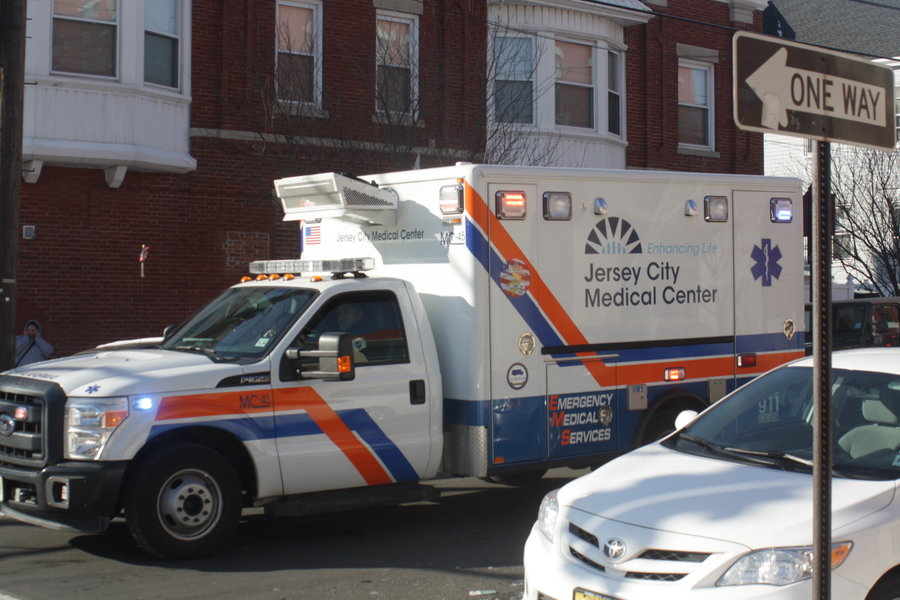Picture this: A man clutches his chest on the 10th floor of a downtown Jersey City high-rise. Although his wife immediately calls 911, and the Jersey City Medical Center EMS team has one of the fastest response times of any ambulance service in the nation, five minutes may be too long to save the man’s life.
In the new more vertical urban landscape, or in crowded cities where traffic jams are common, quicker ways of getting to medical victims are needed.
Minutes matter when it comes to heart attacks or choking. If CPR or some other treatment is applied to a victim within the first few minutes, brain damage or even death might be averted.
In an effort to reduce response time and get help to a victim within two and half minutes, Jersey City plans to team up with Jersey City Medical Center-Barnabas Health and United Hatzalah – an Israeli community-based emergency care program – to unveil a volunteer-based system that would alert medically-trained people near the emergency location to respond first, and apply what could be life-saving measures until professional help arrives.
Mayor Steven Fulop made an appearance at the Jan. 12 City Council caucus to pitch the idea. Fulop said the program would involve no cost to the city but could result in response times of under two minutes, even in traffic-congested areas or on the upper floors of modern hi-rise apartment buildings.
Trained volunteers would respond
Called Community Based Emergency Care (CBEC), the program is based on a system that was started in Israel in 2006 and would be similar to a smaller local program currently run through JCMC for CPR that notifies specially-trained volunteers to respond if they are near an emergency.
Mark Gerson, chairman of United Hatzalah, said CBEC uses a GPS-enabled smart phone app to track and deploy the nearest volunteer who can reach those in need before an ambulance arrives.
“When every second matters, we want to deliver the fastest, best medical service to our residents so we can save more lives.” – Mayor Steven Fulop
____________
Trained by JCMC and with supplies to help provide aid to an emergency victim, volunteers would rush to the scene to provide initial life-saving treatment until the JCMC EMS arrive on the scene, with the objective of reaching patients within 150 seconds from the time of the emergency call to treatment.
The national standard for ambulance response times is eight minutes and 59 seconds; the Jersey City Medical Center ambulance response time is approximately six minutes.
Robert Luckritz, director of EMS for JCMC, said volunteers would be trained and insured by JCMC and operate under JCMC directives. They would not be sent into an active crime scene or any situation which would put them at risk.
He said the goal is to reach a patient within two and half minutes from the time the 911 operator gets the emergency call.
The program in Israel currently uses about 2,500 trained volunteers who respond to about 650 calls per day, Gerson said.
Fulop, who said the program already operates successfully in Israel, said Jersey City could be the first in the nation to adopt the program, although he predicted the idea would become standard practice in the future throughout the nation.
Leveraging technology
“We have seen how effective this program is in Israel and we are excited to be the first city in the United States to launch such an innovative, life-saving program,” the mayor said. “This comes at no cost to the taxpayers.” He said the program will be paid for with private contributions.
Jersey City hopes to get about 50 volunteers to begin training in mid-February and hopes to deploy them by July 1. Fulop said the long range goal is to have 250 volunteers citywide.
The volunteers would have to live or work in Jersey City, and the idea is to get volunteers from throughout the city so that they are ready in each neighborhood to respond.
Fulop said the city will meet with church groups, the Chamber of Commerce, and other civic groups, in an aggressive recruitment campaign over the next month.
Luckritz said the volunteers would receive between 60 to 90 hours of training. While they would not have the extensive training of EMTs, they would have similar level of training that is currently given to Jersey City Fire Department first responders, and would know how to administer oxygen and use a defibrillator.
Each volunteer would carry a bag of gear that would allow him or her to administer basic life support services. In some cases, in high traffic areas, volunteers would also have use of motorcycles or motor scooters to get through traffic jams.
“The idea is simple and it leverages technology,” Fulop said. “As an example, if a 911 call comes into a high-rise building for a heart attack victim on the 10th floor, why should we not try to bridge the response time to provide help if we know there is a doctor or someone who can help on the 5th floor? If we can get to someone within two minutes, we can likely save that life.”
Al Sullivan may be reached at asullivan@hudsonreporter.com.
